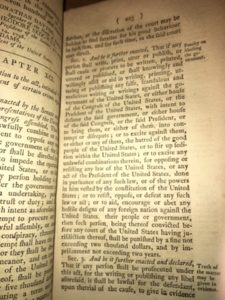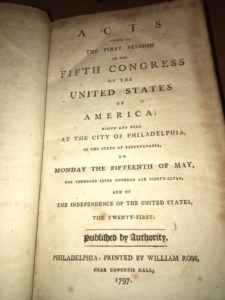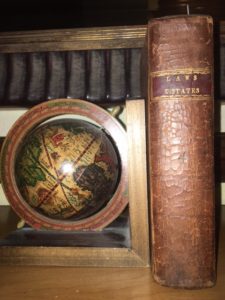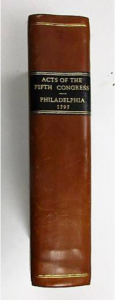ALIEN AND SEDITION ACTS: Acts of the Fifth Congress, Second Session, published by William Ross, Philadelphia, 1798.
Arguably one of the most problematic assaults on the First Amendment in American history, the Alien and Sedition Acts consisted of four laws passed by the Federalist-controlled Congress as America braced for possible war with France. Having been designed to weaken and silence the growing Democratic-Republican Party, the resulting negative reaction helped contribute to the Jefferson’s election in 1800.
The Sedition Act provided for up to two years imprisonment and a fine not to exceed $2,000 for printing or uttering “any false, scandalous and malicious writing or writings against the government of the United States, or either house of the Congress of the United States, or the President of the United States, with intent to defame the said government, or either house of the said Congress, or the said President, or to bring them, or either of them, into contempt or disrepute; or to excite against them, or either or any of them, the hatred of the good people of the United States, or to stir up sedition within the United States, or to excite any unlawful combinations therein, for opposing or resisting any law of the United States, or any act of the President of the United States, done in pursuance of any such law, or of the powers in him vested by the constitution of the United States, or to resist, oppose, or defeat any such law or act, or to aid, encourage or abet any hostile designs of any foreign nation against United States, their people or government, then such person, being thereof convicted before any court of the United States having jurisdiction thereof…”
The Alien Acts were motivated by a desire to lift the influx of Irish immigrants, who were felt to be pro-French. Federalists were also concerned about a perceived unpatriotic press at a time of growing hostilities with France.
Thomas Jefferson described the Sedition Act as a “monster” that would “forever disgrace its parents”:
The Alien bill proposed in the Senate is a monster that must for ever disgrace its parents. I should not have supposed it possible that such an one could have been engendered in either House, & still persuade myself, that it can not possibly be fathered by both. It is truly to be deplored that a standing army should be let in upon us by the absence of a few sound votes. It may however all be for the best. These addresses to the feelings of the people from their enemies, may have more effect in opening their eyes, than all the arguments addressed to their understandings by their friends. The President also seems to be cooperating for the same purpose.
Click here for a link to Jefferson’s letter to James Madison dated May 20, 1798. While Jefferson was highly critical of the Act, he appears to have taken solace in the fact that the Federalists were “opening” the eyes of the country. Of course, little did Jefferson know that would win the Presidency in the election of 1800.
It is difficult to reconcile the four Alien and Sedition Acts with the ten year old Bill of Rights. Under common law, however, freedom of the press only prevented prior restraints on publication, not criminalization of speech. Ultimately, opposition to the Sedition Act strengthened the First Amendment. The Sedition Act was never challenged in the Supreme Court and expired in 1801. Two years later in 1803 the doctrine of judicial review was established by Justice Marshall in Marbury v. Madison.
Click here for a discussion of “madcap” antagonist, author and public intellectual, Thomas Cooper, who was imprisoned six months for libel in 1800 after being persecuted under the Sedition Act.
Copied below are links to each of the Acts:
Naturalization Act of June 18, 1798 (An Act to Establish a Uniform Rule of Naturalization): Lengthened to the period necessary to become an American citizen from five to fourteen years.
Aliens Act of June 25, 1798 (An Act Concerning Aliens): Granted the president the power to deport any foreign born aliens deemed dangerous to the peace, without an explanation, hearing or any due process.
Alien Enemies Act of July 6, 1798 (Act Act Respecting Alien Enemies): Granted the president the power to label foreign born residents as “enemy aliens,” if they were citizens of a country at war with America.
Sedition Act of July 14, 1798 (An Act for the Punishment of Certain Crimes against the United States): Criminalized speaking or publishing “false, scandalous, or malicious” statements against the federal government or Congress “with intent to defame” or bring “into contempt or disrepute.” The criminal penalties included up to two years imprisonment and a $2,000 fine.
Additional reading:
Alien and Sedition Acts (Library of Congress)
Transcript of the Trial of Thomas Cooper (University of Michigan)
FOR SALE ($650)
1797 – Acts Passed at the First Session of the Fifth Congress, which met in Philadelphia from 1797-1798, volume 5 (published by William Ross)
Seller’s description: Re-bound in attractive modern calf and marbled boards, with gilt-lettered morocco spine label. Occasional light toning and mild foxing, Very Good. This is a complete offering of Ross’s printing of the Acts of all three Sessions of the Fifth Congress, including the Alien & Sedition Acts and establishment of the Marine Corps, plus a treaty with the Cherokees.






